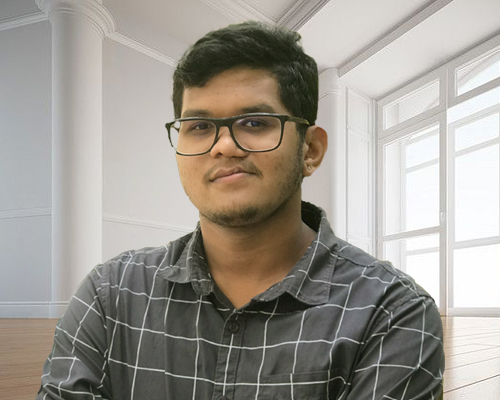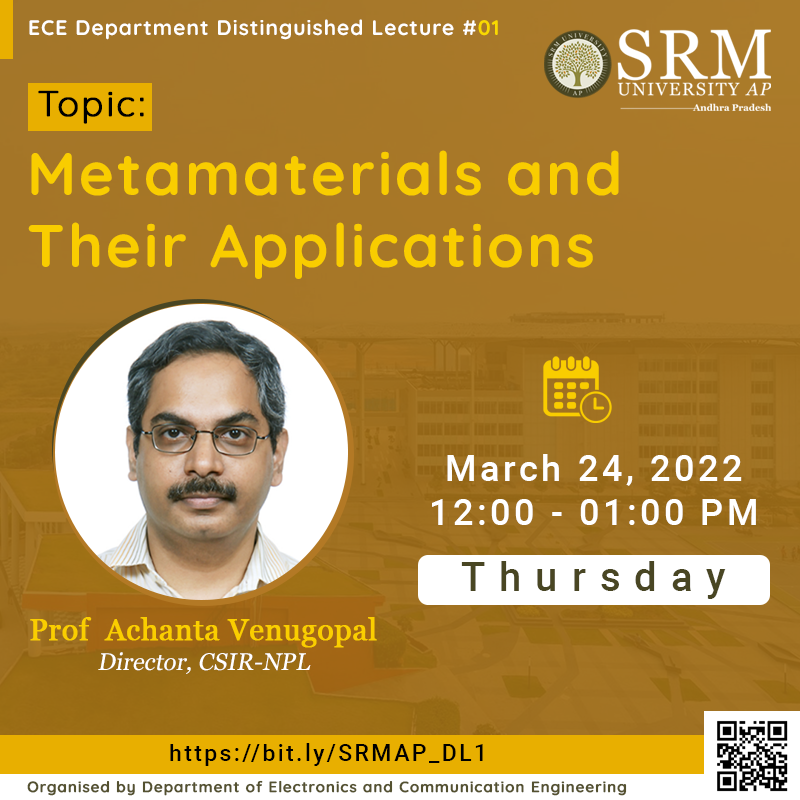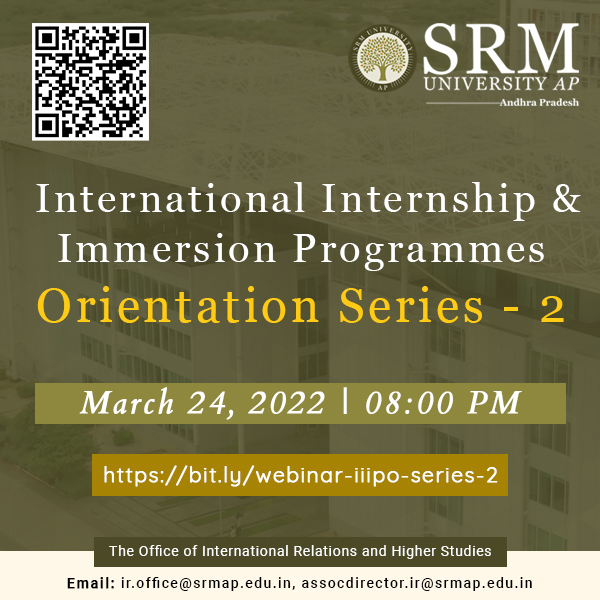- Journey of BSc Integrative Biology student to QS ranked universities March 25, 2022
 Our bright young minds bring fame and glory to the university from all around the world. Mr Haseesh Rahithya Nandam, from the final year of BSc (Hons) Integrative Biology, has received admission offers to MSc Infection and Immunity course, University College London (QS ranking 8) and MSc Medical and Molecular Virology, The University of Manchester (QS ranking 27).
Our bright young minds bring fame and glory to the university from all around the world. Mr Haseesh Rahithya Nandam, from the final year of BSc (Hons) Integrative Biology, has received admission offers to MSc Infection and Immunity course, University College London (QS ranking 8) and MSc Medical and Molecular Virology, The University of Manchester (QS ranking 27).UCL is rated the top university in the UK for research strength in the most recent Research Excellence Framework. The MSc course that Mr Haseesh has enrolled in primarily focuses on teaching concepts of infection and immunity. It contains course modules such as Molecular Virology, Evolution of Diseases, and Epidemiology.
“I am excited and happy since UCL stands in 8th rank and offers a course I dearly love to study”, says Mr Haseesh. According to him, the selection process for University College London was a piece of cake. The admission requirements were the English language proficiency test (IELTS/TOEFL) result, SoP, LoRs, CV, and Grade Card. He has also applied to Imperial College London and is waiting for the admission announcement.
SRM University-AP enables students to become the best version of themselves every single day and work towards their goals. “I am grateful for the support of my professor Dr Sutharsan Govindarajan to work in his lab. There, I got the opportunity to gain experience and learn new things”, says Mr Haseesh. He further thanked the Head of the Department, Prof Jayaseelan Murugaiyan, for his relentless guidance and support.
Continue reading → - Varying impact of health expenditure in Southeast Asia March 24, 2022
Health expenditure assumed enormous importance with the outset of coronavirus pandemic. The disparity between public and private health expenditure will often reflect in the health outcome of any nation. Through the research paper titled ‘The dynamics of public and private health expenditure on health outcome in Southeast Asia’ published in the journal Health and Social Care in the Community, Dr Shailender Singh, Associate Professor, Department of Commerce, attempts to argue that public expenditure on health has a substantial impact over private spending across the countries of ASEA.
Abstract of the Research
This study examines the dynamics of public and private health expenditure on health outcomes in Southeast Asia, vis-a-vis two of the Sustainable Development Goals (SDGs). The techniques of fixed effect, random effect, and feasible generalized least square methods are employed to obtain robust estimates. Further, the analysis dives deep into the country-specific impact of public and private health expenditure on health outcomes using the technique of seemingly unrelated regression. Estimates show that, across Southeast Asia, public health expenditure alone contributes to improving life expectancy at birth, lower levels of under-five, and non-communicable disease mortality rates. Unlike public health expenditure, private health expenditure contributes to better health outcomes only in Brunei and Singapore but not across the countries of Southeast Asia.
The paper asserts that, despite the statistical significance of private health spending with respect to the health outcomes, it does not contribute to lower mortality rate (MR) and higher life expectancy at birth. The results strongly support several prior pieces of evidence in the literature regarding health expenditure and health outcomes. The country-specific estimates show that public health spending contributes greatly to lower mortality rate, particularly in Brunei and Singapore. By contrast, private health spending does not contribute to lower levels of U5MR and NCD mortality rate across the countries of ASEA except in Cambodia, Indonesia, and Philippines.
The differences in economic development and the settings of health systems in these countries could be a plausible reason for the inability of private health expenditure to contribute to lower levels of NCD mortality rate in most of these countries. The result implies that more funding to the public health system has the potential to lower U5MR and NCD MR close to the SDGs target across the countries of ASEA. Also, strengthening the health system through providing greater access to preventive services for diabetes, hypertension, respiratory diseases, and cancers at primary care units may help in better diagnosis and management of these chronic conditions in Indonesia, Laos, and Myanmar where NCD MR is relatively high. However, an increase in funding alone may not be sufficient at improving health outcomes. For emerging conditions, diet modification, active physical exercise, little tobacco and alcohol consumption are also imperative.
The research is reported to be the first of its kind that examines the dynamics of public and private health expenditure on health outcomes in line with the SDGs targets. Apart from the traditional indicators commonly used as health outcomes in the literature (life expectancy and U5MR), the study further extends the literature by introducing NCD MR as an additional health outcome which could play a pivotal role in providing empirical evidence to the health policymakers and researchers.
Health plays an important role in promoting human capital and the economic growth of a country. The available stock of human capital in a country determines the rate of growth in its per capita income. A healthy individual contributes more to their economy by allocating more hours to work, earning more disposable income, in turn investing more in human development.
As the individual stock of health tends to diminish over time, there is a need to augment it by making more investment in time, income, and regular medical care. Thus, this research work has a societal benefit for the population of Southeast Asia to identify the threats in the field of health and focus more on their well-being for improving the state of health. Dr Singh conducted this research in collaboration with Dr Nishant Kumar, Amity University, Noida.
In future, he also intends to analyse the impact of socioeconomic and behavioural health determinants on the health system efficiency of the Middle East region, and to predict the key drivers for health care expenditure growth in the Middle East region through Grossman-PLS Modeling Approach.
- Metamaterials and their applications: Distinguished Lecture Series March 23, 2022
The Department of Electronics and Communication Engineering is hosting the first segment of the ECE Department Distinguished Lecture Series on March 24, 2022, from 12.00 pm to 01.00 pm IST. Prof Achanta Venugopal, Director, CSIR-NPL is the distinguished speaker of the event. He will be delivering a talk on the topic “Metamaterials and their Applications”.
Abstract of the Talk
Metamaterials are designed materials with unique properties that may not exist in naturally available materials. These are designed with sub-wavelength size components. In this talk, after briefly introducing metamaterials, the speaker will discuss on a few metal-dielectric and all dielectric metamaterials and their applications in wide-ranging areas covering stealth, single-photon emitters, reusable biosensors among others.
Speaker’s Profile
Venu Gopal Achanta obtained his PhD in Physics from Tata Institute of Fundamental Research, Mumbai and PhD in Electronics from Tokyo University, Tokyo, Japan. He is currently the Director of CSIR-National Physical Laboratory, Delhi. He is on lien from Tata Institute of Fundamental Research, Mumbai where he is a professor in the Department of Condensed Matter Physics and Material Science. He has served in various TIFR committees as chair and member. He is also on the senates of IISER, Berhampur and IIT, Delhi. He is a member of the executive council of Optical Society of India, vice-chair of IEEE Photonics Mumbai chapter and member of the program committee of the Association of Asia Pacific Physics Societies – Division of Condensed Matter Physics. He is on the editorial board of journals, Scientific Reports, Frontiers in Physics, Encyclopedia of Applied Physics, and the Indian Journal of Pure and Applied Physics. He is an honorary Fellow of the Metrology Society of India and senior member of IEEE. His research interests are in nano and quantum photonics with over 140 journal publications.
Join here for an insightful session with Prof Achanta Venugopal.
- Orientation: International internship and immersion programmes-II March 23, 2022
With so many options, students are frequently puzzled when selecting a course, studying its scopes, and aligning themselves with the prerequisites for going abroad.
A webinar series on International Internship & Immersion Programmes is being organised by the Office of International Relations and Higher Studies at SRM University-AP. Interested students can gain a detailed overview of international programmes and their preparation procedures.
Date: March 24, 2022. Time: 8.00 pm
Join the second episode of this illuminating series and get one step closer to your ambition of studying abroad!
Continue reading → - Dr Johannes Kirscher March 22, 2022




